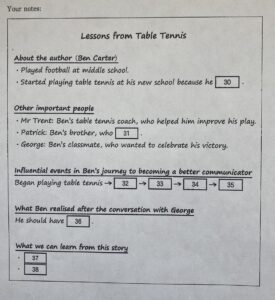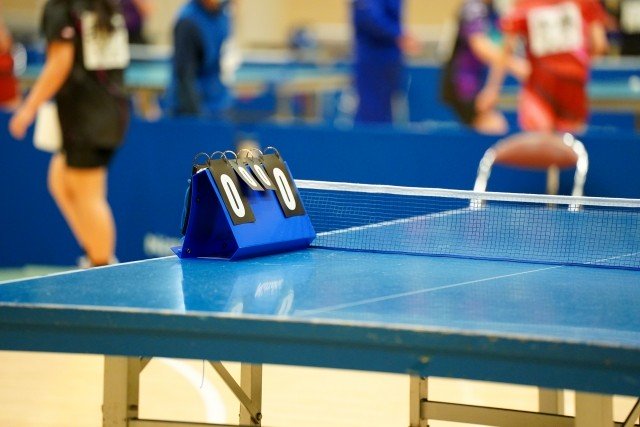今回から、先日2023年に実施された大学入学共通テストでの
英語の問題を扱って行きます。
基本的な問題の扱い方
今回、このブログでは、
共通テスト(英語)の「リーディング」の問題だけを扱うこととします。
基本的な問題の扱い方は、下記の通りにします。
①問題の提示
※基本的には「大問」毎に扱う予定ですが、問題の量などによりそれより細かく区切って取り扱うこともあります。
②模範解答の提示
③解説
④そのほかの補説
今回は第4問の解説です。
第5問:配点15
※各大問の英文や図表を読み、解答番号【 1 】〜【 49 】にあてはまるものとして
最も適当な選択肢を選びなさい。
Your English teacher has told everyone in your class to find an inspirational
story and present it to a discussion group, using notes. You have found a
story written by a high school student in the UK.
unexpected and I had no time to react. I lost the point and the match
Defeat … Again! This is how it was in the first few months when I started
playing table tennis. It was frustrating, but I now know that the sport taught
me more than simply how to be a better athlete.
In middle school, I loved football. I was one of the top scorers, but I
didn’t get along with my teammates. The coach often said that I should be
more of a team player. I knew I should work on the problem, but
communication was just not my strong point.
I had to leave the football club when my family moved to a new town. I
wasn’t upset as I had decided to stop playing football anyway. My new school
had a table tennis club, coached by the PE teacher, Mr. Trent, and I joined
that. To be honest, I chose table tennis because I thought it would be easier
for me to play individually.
At first, I lost more games than I won. I was frustrated and often went
straight home after practice, not speaking to anyone. One day, however, Mr
Trent said to me, “You could be a good player, Ben, but you need to think more
about your game. What do you think you need to do?” “I don’t know,” I
replied, “focus on the ball any more?” “Yes,” Mr Trent continued, “but you also
need to study your opponent’s moves and adjust your play accordingly.
Remember, your opponent is a person, not a ball.” This made a deep
impression on me.
I deliberately modified my style of play, paying closer attention to my
opponent’s moves. It was not easy, and took a lot of concentration. My
efforts paid off, however, and my play improved. My confidence grew and I
started staying behind more after practice. I was turning into a star player,
becoming popular, but our conversations seemed to end before they really got
started. Although my play might have improved, my communication skills
obviously hadn’t.
My older brother Patrick was one of the few people I could communicate
with well. One day, I tried to explain my problems with communication to him,
but couldn’t make him understand. We switched to talking about table tennis.
“What do you actually enjoy about it?” he asked me curiously. I said I loved
analysing my opponent’s movements and making instant decisions about the
next move. Patrick looked thoughtful. “That sounds like the kind of skill we
use when we communicate,” he said.
At that time, I didn’t understand, but soon after our conversation, I won a
silver medal in a table tennis tournament. My classmates seemed really
pleased. One of them, George, came running over. “Hey, Ben!” he said, “Let’s
have a party to celebrate!” Without thinking, I replied, “I can’t. I’ve got
practice.” He looked a bit hurt and walked off without saying anything else.
Why was he upset? I thought about this incident for a long time. Why did
he suggest a party? Should I have said something different? A lot of questions
came to my mind, but then I realised that he was just being kind. If I’d said,
“Great idea. Thank you! Let me talk to Mr Trent and see if I can get some
time off practice,” then maybe the outcome would have been better. At that
moment Patrick’s words made me sense. Without attempting to grasp
someone’s intention, I wouldn’t know how to respond.
I’m still not the best communicator in the world, but I definitely feel more
confident in my communication skills now than before. Next year, my friends
and I are going to co-ordinate the table tennis league with other schools.

問1 Choose the best option for 【 30 】.
① believed it would help him communicate
② hoped to become popular at school
③ thought he could win games easily
④ wanted to avoid playing a team sport
問2 Choose the best option for【 31 】.
① asked him what he enjoyed about communication
② encouraged him to be more confident
③ helped him learn the social skills he needed
④ told him what he should have said to his school friends
問3 Choose four out of the five options (①〜⑤) and rearrange them in the
order they happened.【 32 】→ 【 33 】→【 34 】→【 35 】
① Became a table tennis champion
② Discussed with his teacher how to play well
③ Refused a party in his honour
④ Started to study his opponents
⑤ Talked to his brother about table tennis
問4 Choose the best option for 【 36 】.
① asked his friend questions to find out more about his motivation
② invited Mr Trent and other classmates to the party to show appreciation
③ tried to understand his friend’s point of view to act appropriately
④ worked hard to be a better team player for successful communication
問5 Choose the the best two options for 【 37 】and 【 38 】.
(The order does not matter.)
① Advice from people around us can help us change.
② Confidence is important for being a good communicator.
③ It is important to make our intentions clear to our friends.
④ The support that teammates provide one another is helpful.
⑤ We can apply what we learn from one thing to another.
👉模範解答と解説は次のページです。



コメント